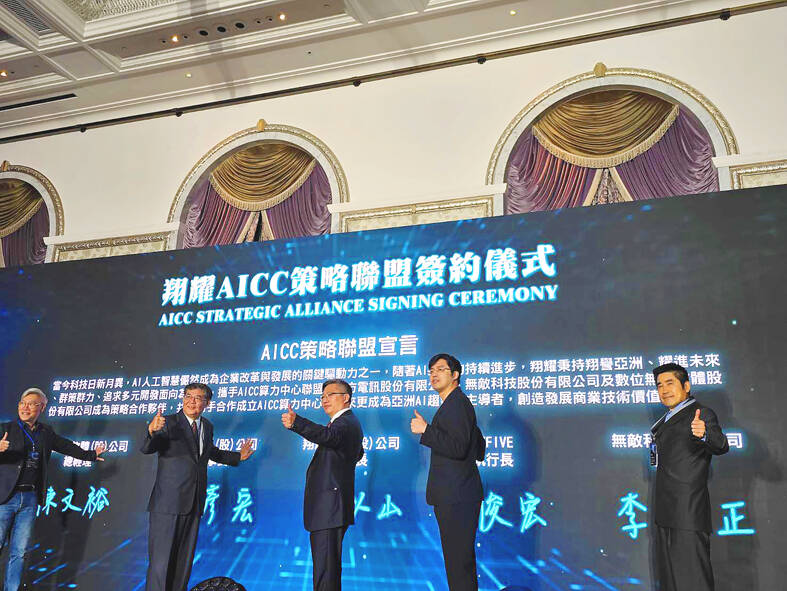The establishment of an artificial intelligence (AI) computing center by an alliance of Taiwanese enterprises was announced yesterday, with the aim of advancing Taiwan’s AI capabilities.
The AI Computing Center (AICC) will be “the first in Asia” to use Nvidia Corp’s H200 AI chips that have 1.43 times the computing power of H100 chips, as well as advanced liquid-cooling systems provided by AI infrastructure solution provider Super Micro Computer Inc, ENLight Corp (翔耀實業) chairman Joe Lin (林以山) said at a press conference in Taipei.
AICC’s operations will officially start in the fourth quarter of this year with 64 servers, and will be located in Chief Telecom Co’s (是方電訊) smart Internet Data Center in Taipei, Lin said.

Photo: Wang Yi-hung, Taipei Times
“But eventually there will be a total of 256 servers,” with computing power totaling 93 PFLOPS (or petaFLOPS, floating-point operations per second, a measure of computer performance in computing), placing it around 15th place in the world’s ranking of supercomputers’ computing power, he added.
Lin did not say when all of the 256 servers would be up and running.
The purpose of the center is to “help Taiwan to advance its strength from

PERSISTENT RUMORS: Nvidia’s CEO said the firm is not in talks to sell AI chips to China, but he would welcome a change in US policy barring the activity Nvidia Corp CEO Jensen Huang (黃仁勳) said his company is not in discussions to sell its Blackwell artificial intelligence (AI) chips to Chinese firms, waving off speculation it is trying to engineer a return to the world’s largest semiconductor market. Huang, who arrived in Taiwan yesterday ahead of meetings with longtime partner Taiwan Semiconductor Manufacturing Co (TSMC, 台積電), took the opportunity to clarify recent comments about the US-China AI race. The Nvidia head caused a stir in an interview this week with the Financial Times, in which he was quoted as saying “China will win” the AI race. Huang yesterday said

Nissan Motor Co has agreed to sell its global headquarters in Yokohama for ¥97 billion (US$630 million) to a group sponsored by Taiwanese autoparts maker Minth Group (敏實集團), as the struggling automaker seeks to shore up its financial position. The acquisition is led by a special purchase company managed by KJR Management Ltd, a Japanese real-estate unit of private equity giant KKR & Co, people familiar with the matter said. KJR said it would act as asset manager together with Mizuho Real Estate Management Co. Nissan is undergoing a broad cost-cutting campaign by eliminating jobs and shuttering plants as it grapples

TEMPORARY TRUCE: China has made concessions to ease rare earth trade controls, among others, while Washington holds fire on a 100% tariff on all Chinese goods China is effectively suspending implementation of additional export controls on rare earth metals and terminating investigations targeting US companies in the semiconductor supply chain, the White House announced. The White House on Saturday issued a fact sheet outlining some details of the trade pact agreed to earlier in the week by US President Donald Trump and Chinese President Xi Jinping (習近平) that aimed to ease tensions between the world’s two largest economies. Under the deal, China is to issue general licenses valid for exports of rare earths, gallium, germanium, antimony and graphite “for the benefit of US end users and their suppliers

Dutch chipmaker Nexperia BV’s China unit yesterday said that it had established sufficient inventories of finished goods and works-in-progress, and that its supply chain remained secure and stable after its parent halted wafer supplies. The Dutch company suspended supplies of wafers to its Chinese assembly plant a week ago, calling it “a direct consequence of the local management’s recent failure to comply with the agreed contractual payment terms,” Reuters reported on Friday last week. Its China unit called Nexperia’s suspension “unilateral” and “extremely irresponsible,” adding that the Dutch parent’s claim about contractual payment was “misleading and highly deceptive,” according to a statement